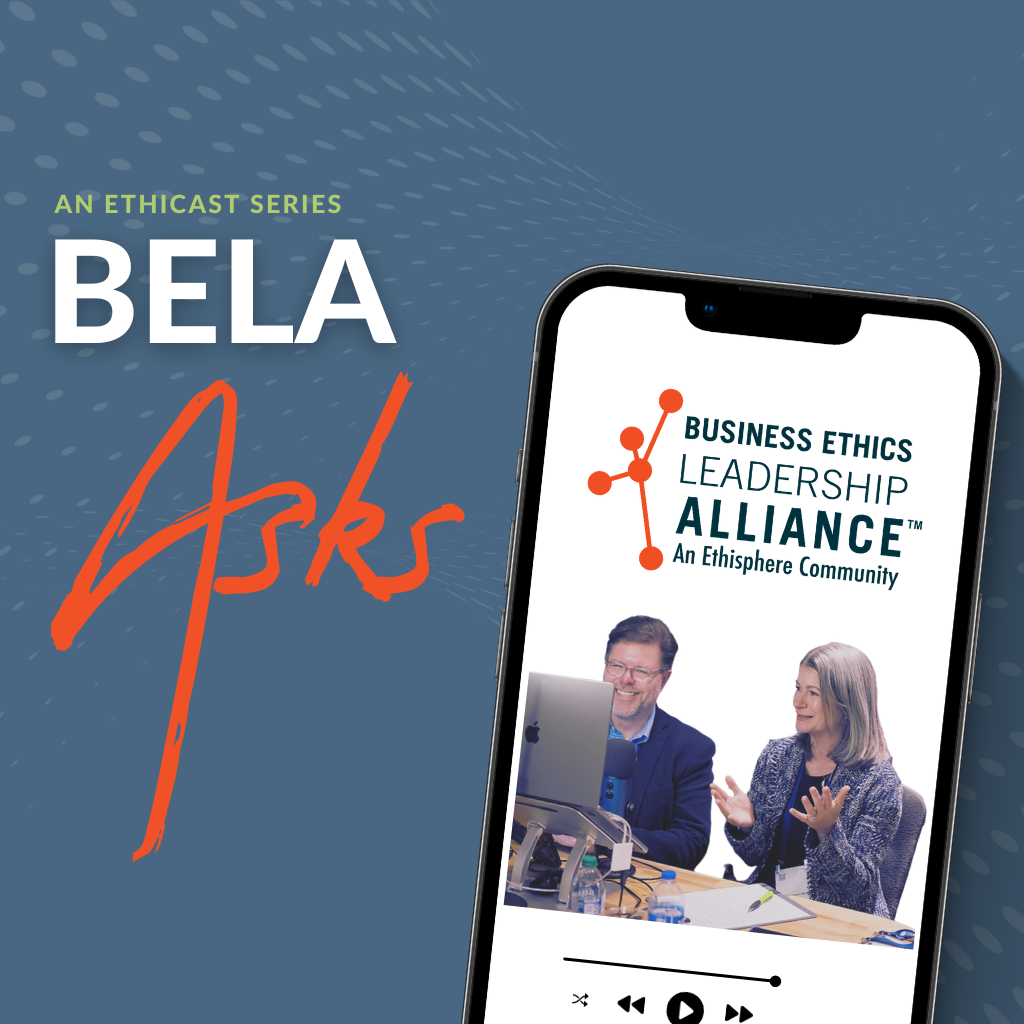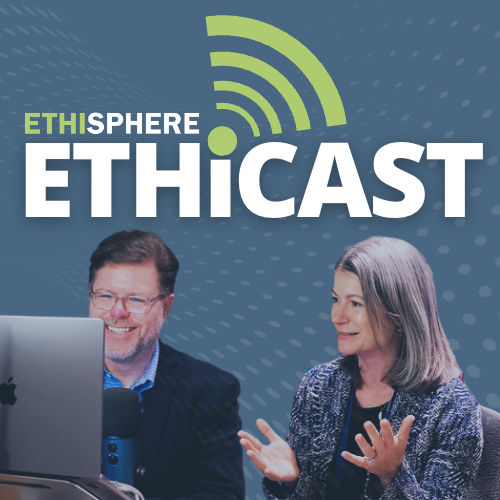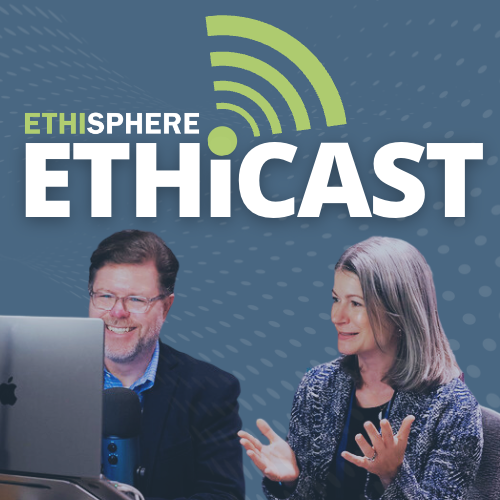[00:00:00] Speaker A: Hi, everyone. The Business Ethics Leadership alliance has questions and we have answers. I'm your host, Bill Coffin. Welcome to another Bella Asks episode of the Ethicast.
The Business Ethics Leadership alliance, or bella, is a global ethics and compliance community that provides exclusive access to helpful data, program benchmarking, roundtable events, and a resource library with hundreds of policy guidance documents, member contributed program examples, and more. One of Bella's most popular benefits is the concierge service, in which members can submit any question at all regarding ethics and compliance, and our internal experts will provide an answer and helpful resources with additional information.
And while we invite everyone watching and listening to join bella, we also know that there's no competition in compliance, which is why we're using this program to thematically respond to high level questions from the Bella community for the benefit of E and C teams everywhere. And joining us once again to answer those questions is Bella chair Erica Salmon Byrne. Erica, it's great to see you again.
[00:01:07] Speaker B: Oh, Bill, thanks so much for having me back.
[00:01:10] Speaker A: Well, our next question is a program question and it reads, what are some fresh Ideas for a 2025 Ethics Week?
[00:01:18] Speaker B: Yeah. So the fact that this BELLA member is asking this question says to me that they have already gone through the Bella member hub and looked at the various ideas that we have on the hub, including our own toolkits for Ethics Week. So if you are thinking about your Ethics Week and you haven't done that yet, that's step number one for the BELLA members that are out there listening. We have a lot of great materials up there for organizations that are thinking about their Ethics Week, but for somebody who's kind of used a lot of those ideas, they've run through it, they need something new. Right. This is, it's time for. It's time for some fresh thinking. I would go back to your team and sit down and say, what are the two things we're looking to accomplish with this Ethics Week? Maybe three. Two or three things you're looking to accomplish with this Ethics Week, you're probably going to come up with engaging employees on the resources that we have available to them to be able to make the right decisions in real time. And celebrating employees that are doing the right thing or are otherwise engaging with the program. Right. Often, Ethics Week, the purpose of Ethics Week is a combination of awareness, education and celebration. So if you think about those three goals, then you want to go to the modalities that are available to you to engage your employees.
Are you a heavy video company? For example, do you have a podcast that's in existence already. For example, are you big Slack users? Are you big teams users? Are you big intranet users? Right. Talk to your comms team about what they're seeing employees engage with and use that to kind of plan your program.
So that's sort of the, the, the, the, the first thing to do is to think about modalities.
Second thing, and those of you who are familiar with my triangle of communications will know where I'm going with this. Second, second thing to think about is your messenger. Are you going to rely just on your ENC staff to do the messaging around Ethics Week? Very often we do see companies doing that because it's a chance to highlight who you've got on your team. And they're probably pretty great people, and they're probably people that employees don't always engage with. But can you add into the mix some other folks? Can you add into the mix a couple of ambassadors that did really great work this year? Can you add into the mix a couple of employees who maybe spotted a risk that hadn't been fully mitigated and brought it to the attention their managers? Right. Is there someone that you can highlight that is an unusual messenger for the E and C team to use that will be additive to the goals that the team has for Ethics Week? Then the third thing, of course, is the message, right? What are you actually going to communicate about in Ethics Week? And there's a lot of different ways to think about this, but I would urge everybody listening to lean into storytelling, right? Think about things that have happened inside your organization and ways that you can use real things that have happened to raise awareness and educate employees within the confines of this week that you have on the calendar where you get a chance to grab everybody's attention. So maybe you've had a lot of conflicts of interest issues, right? Maybe you've had a lot of gifts and entertainment issues. Maybe you've had people abusing your time off policy, Right. And fabricating pets that died and ants that passed and things like that, right? Whatever the issue is that you might have been running into, think about ways that you can take those stories and use those stories to educate. And this is really going to hit a couple of marks. First off, we know that people learn via stories, right? That is how we retain information. That is how we absorb information.
So if you are, you know, for example, dealing with a big conflicts of interest trend, using those stories to say, we don't hire our cousin and here's why, right? And if you want more information, here's our gifts Our conflicts of interest policy, those kinds of tie ins. Let me grab you with the fact pattern, right? Let me grab you with the fact pattern. We all have an interest in what's happened, right? Like there's an inherent tiny little piece of all of us that wants to be like, I wonder who that was, right? Like, who could that have been? Utilize that maybe scurrilous, you know, sort of indication on the part of the employees that are listening, but use it to grab them, right? Tell the story, do something that, that hooks me as the reader or the listener that you can then use to educate me about why you need me to make a particular choice. We don't hire our cousins because fill in the blank, right? We get bad service, we get overcharged, you know, people take advantage of us. And here's more information on our conflicts of interest policy. So that if you are in a hiring position and your cousin comes to you and says, hey, I want a gig, you have the ability to say no.
So those are some of the things that we see organizations doing right now. So think about your modalities first. Think about your goals, think about your modalities, think about the fact patterns that are available to you to be able to achieve that transference of information.
And then utilize whatever voices you have at your fingertips to be able to get that message out to a place. And Bill, I just see you on the edge of your seat with a follow up question. Yes, you can ask the follow up question.
[00:06:43] Speaker A: This is why I don't play poker. So I do not play poker.
I guess, you know, I'm all about storytelling and I love how you leaned in the storytelling piece. I guess it wasn't so much a question, but more of a comment, which is, you know, we often talk about how storytelling is a super effective way for people to absorb information. But what I'll just add on to that is that it's also an extraordinarily effective way for people to then take the information they've absorbed and pass along to other people outside of you. Since humanity has gathered in caves and stared at the fire, we have used stories to pass information along. And stories take on a life of their own. And that's why they have such magic to them, such power to them. So I would just say that we focus very much on, you can reach people through story, but those people will reach more people you weren't there to reach the first time around because of the story. And that's why they're so powerful and they're so great. I would just Caution people not forget that important piece of it.
[00:07:37] Speaker B: Oh, no. Yeah, 100%, Bill. I think that's so critical, especially because a good Ethics Week is viral, right? Like, that's, like, that's what you're, that's, you know, if, if I'm, if I'm going to kind of just one piece of. What you're hoping to achieve with Ethics Week is you want a piece of that, of that content, you want a piece of that message to go viral. And the best way to have something go viral is to have other people pick it up and start to tell that story for you. So whether that is like, hey, you know, listen to this crazy thing. Do you think that was Bob? Or, you know, whatever it is, if you can get people to take it and pass it on. Right? One of my early mentors told me that the best way, you know, the, the formula for absorbing information is watch one, do one, teach one.
And so it's that same kind of formula when you think about, about what you're trying to accomplish with your Ethics Week, you're listening to the story, passively absorbing it. The information coming in from whatever modality you're using. You're then turning to your co worker and saying, did you hear about this? Did you know about this? This is crazy, right? And then you're in a conversation about it and you're, you're passing that information along and have, and having a dialogue about, well, how could this happen here? Right? The other thing I love that I'm seeing a lot in Ethics Week situations, if you are in the situation where your employee relations folks or your legal team is like, no real stories, I don't care how much you anonymize the details, you know, you can't tell, you can't tell real stories. Well, that's when you go to the news, right? That's when you go to the news. You go to other people's misfortune, pick something out of the news and say, not just, hey, here's this crazy thing. Let's talk about why it's crazy. Here's this crazy thing. How could it happen here? What would it look like here? What does this fact pattern turn into here? And have teams take those tabletop exercises and really say, this is what it looked like. This is what it would look like if it happened here.
[00:09:34] Speaker A: Indeed, indeed. And to that end, if anybody out there is going, wow, Erica made a great point. I, you know, but I don't really know how to do that myself. I would encourage you check out the Ethicast YouTube channel, we have a bunch of episodes where Erica and I have talked about news, you know, stories in the moment and taking that exact same approach to it. And then also on the Ethisphere blog right
[email protected], we've got a great article about lessons learned from 2024, and basically just a rundown of the biggest ENC stories from the year. And, and kind of where do they, where do they take you from the ENC discipline? And they're just, they're, they're just a, a, a trove of examples to draw upon. So.
[00:10:08] Speaker B: Yep.
[00:10:09] Speaker A: Well, Erica, as always, we appreciate you weighing in on these questions. Thank you so much for joining us.
[00:10:13] Speaker B: Oh, absolutely. It's 100% my pleasure, Bill. It's one of my favorite things that I get to do as the executive chair of Bella, and, and that means I'm going to sign off my usual way, which is to all of you Bella members out there, keep the questions coming, please, because it means I get to come back and talk to my friend Bill.
[00:10:30] Speaker A: To learn more about Bella, please visit@the sphere.com Bella to request guest access to the member resource hub and to speak with the BELLA engagement director. And if you have a question that you would like answered on this program, contact the Bella Concierge service and we'll get to work on it for you. I'm Bill Coffin, and this has been another Bella Asks episode of the Ethicast. If this is your first time listening, we hope you've enjoyed the show. For more content like this every week, please subscribe here on YouTube, Apple Podcasts or Spotify. You can also get our free weekly
[email protected] ethicast and we've got plenty more content for
[email protected] resources. Thanks so much for joining us. And until next time, remember, strong ethics is good business.


